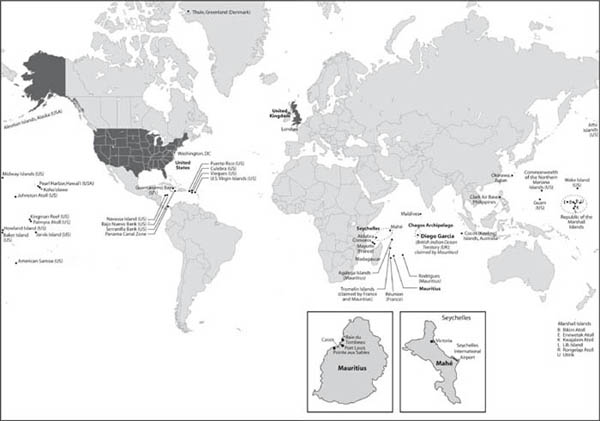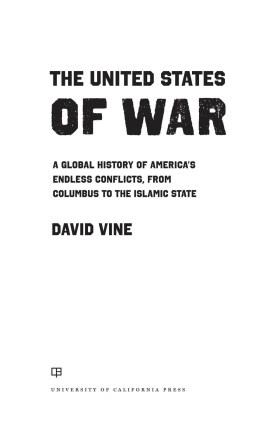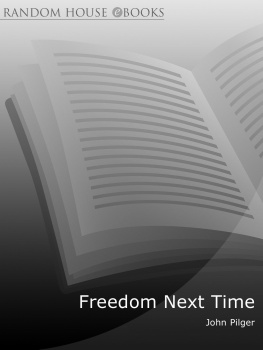ISLAND OF SHAME
ISLAND OF
SHAME
The Secret History of
the U.S. Military Base
on Diego Garcia
With a new afterword by the author
David Vine

Copyright 2009 by Princeton University Press
Published by Princeton University Press, 41 William Street,
Princeton, New Jersey 08540
In the United Kingdom: Princeton University Press, 6 Oxford Street,
Woodstock, Oxfordshire OX20 1TW
press.princeton.edu
All Rights Reserved
Fourth printing, and first paperback printing, 2011
Paperback ISBN 978-0-691-14983-7
THE LIBRARY OF CONGRESS HAS CATALOGED THE CLOTH EDITION OF THIS BOOK AS FOLLOWS
Vine, David, 1974
Island of shame : the secret history of the U.S. military base on Diego Garcia / David Vine.
p. cm.
Includes bibliographical references and index.
ISBN 978-0-691-13869-5 (hbk. : alk. paper) 1. United States. Naval Communications Station, Diego GarciaHistory. 2. Military bases, AmericanBritish Indian Ocean TerritoryDiego Garcia. 3. ChagossiansHistory. 4. Population transfersChagossians. 5. RefugeesMauritius. 6. RefugeesBritish Indian Ocean Territory. 7. British Indian Ocean TerritoryHistory. 8. Diego Garcia (British Indian Ocean Territory)History.
I. Title.
VA68.D53V66 2008
355.709697dc22 2008027868
British Library Cataloging-in-Publication Data is available
This book has been composed in Adobe Garamond
The author will donate all royalties from the sale of this book to the Chagossians.
Printed on acid-free paper.
Printed in the United States of America
5 7 9 10 8 6 4
No person shall be... deprived of life, liberty, or property, without due process; nor shall private property be taken for public use, without just compensation.
Fifth Amendment to the United States Constitution, 1791
No one shall be subjected to arbitrary arrest, detention or exile.... No one shall be subjected to arbitrary interference with his privacy, family [or] home.... No one shall be arbitrarily deprived of his property.... Everyone has the right to freedom of movement and residence within the borders of each State.
Articles 9, 12, 17, 13, Universal Declaration
of Human Rights, 1948
We, the inhabitants of Chagos IslandsDiego Garcia, Peros Banhos, Salomonhave been uprooted from those islands.... Our ancestors were slaves on those islands, but we know that we are the heirs of those islands. Although we were poor there, we were not dying of hunger. We were living free.
Petition to the governments of the United Kingdom
and the United States, 1975
CONTENTS
ILLUSTRATIONS AND TABLES
ILLUSTRATIONS
TABLES
FOREWORD BY MICHAEL TIGAR
I write this foreword with pride and humility. Pride, because I was present when David Vine first had the inspiration to take on the task of research and writing that led to the book you are holding. The year was 2001. I was part of a team of lawyers from Great Britain, Mauritius, and the United States who were seeking justice for the Chagossian people. I had just returned from visiting the camps in which they are housed in Mauritius. It seemed to me that if we were to explain the Chagossian story of betrayal, struggle, and hope, it would be essential to understand their history, culture, and present condition. A series of telephone conversations led me to Dr. Shirley Lindenbaum, a cultural anthropologist of international renown. She suggested that David Vine would be a perfect candidate for this job. David, Dr. Lindenbaum, and two of my colleagues met in New York, and David launched the work that was to consume him for seven years. From this minor role in the beginning, I take pride.
As for humility: This book and the work it represents have succeeded beyond my greatest hopes. David Vine is one of those rare scholars who combines all the qualities that one must have to write in this field. We are witnessing, on a global scale, the subordination and forced disappearance of hundreds of indigenous populations. We read of the more sensational and violent episodes of these conflicts, but so many others escape our notice. An indigenous population is not entitled, under what passes for international law, to automatic protection from dislocation. Its status as a cohesive group must first be established. When it is proposed to impose upon it, one must ask what aspects of its culture and history are to be seen as essential or important.
In this process of determining what is just and what is not, the people about whom one is speaking need a voice. They need the help of someone who will understand their lives as deeply as possible and portray their situation honestly and in terms that will withstand debate. David Vine has, in this book, shown us that he combines the scholars rigor with the students sympathetic understanding.
I have been a lawyer and law teacher for more than forty years. Given the nature of complex litigation, and particularly human rights litigation, we need to call upon experts in various fields to help us present claims for justice. We know that our adversaries will bring their own experts, and each experts conclusions will be subject to testing in the crucible of cross-examination. From the beginning, David Vine has identified and followed all the principles of academic rigor that make this study credible as well as persuasive.
David Vines scholarship is also informed by his systematic and disciplined worldview. He sees the Chagossian people in the context of global struggle. He provides us with a context that makes their story compellingand relevant. Choices about peoples fates and futures are not simply matters of preference, as to which one view is as good as another. Today, we understand that verifiable arguments about the human condition can, and must, be based on close observation of the social forces that people confront as they seek the basic rights that the international community has now defined as essential. David Vine has made an indispensable contribution to this process.

Figure 0.1 World Map, with Diego Garcia and Chagos Archipelago near center; Mauritius and Seychelles insets; the United States of America including all officially claimed territories.
ABBREVIATIONS AND INITIALISMS
CIA | Central Intelligence Agency |
CNO | Chief of Naval Operations |
CRG | Chagos Refugees Group |
DOD | Department of Defense |
FOIA | Freedom of Information Act |
GOM | Government of Mauritius |
HMG | Her Majestys Government [Government of the United Kingdom] |
IMF | International Monetary Fund |
ISA | Office of International Security Affairs, Department of Defense |
JCS | Joint Chiefs of Staff |
NASA | National Aeronautics and Space Administration |
NSC | National Security Council |
Rs | Rupees [currency of Mauritius and the Seychelles] |
USG | U.S. Government |
USO | United Service Organization |
Next page








